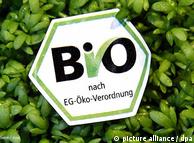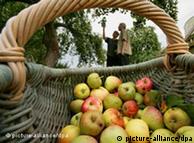Consumer Affairs | 15.12.2011
Germany mulls stricter labeling rules for regional foods
Names aren't always what you think they are, especially when it comes to regional German foods.
"Black Forest Crème with sheep's cheese," for instance, is the name of a cream cheese produced by the German company "Schwarzwaldmilch" or "Black Forest Milk." With a label like that, most consumers would think they were buying a product made from the milk of sheep grazing on pastures somewhere in the Black Forest, right?
Wrong: The cream cheese has little to do with the Black Forest. The product contains only 25 percent sheep's milk - and it comes from Greece, according to a complaint filed on the consumer protection website "Lebensmittelklarheit.de."
Details about regional origins
The Internet platform, launched earlier this year by the German ministry for Consumer Protection, provides a forum for consumers who feel misled to express their view and also informs them about labeling rules.
 Germany's Consumer Minister Ilse Aigner seeks clear criteria for local produceIn a survey this summer, 80 percent of consumers said they thought details about the regional origin of a product were important.
Germany's Consumer Minister Ilse Aigner seeks clear criteria for local produceIn a survey this summer, 80 percent of consumers said they thought details about the regional origin of a product were important.
While the European Union has so-called "geographical protection" labeling rules, Germany's Consumer Protection Minister Ilse Aigner told Dow Jones that these laws are "concerned with protecting traditional recipes" and not necessarily regionally raised and produced food products.
Aigner's spokeswoman Mareike Enderle told Deutsche Welle that one of the difficulties lies in defining the term "regional."
"We are currently working on coming up with a framework, together with the consumer ministries in the states or Bundesländer, as well as with producer associations, retail industry and consumer rights organizations," she said.
That could prove to be a challenge. The different stakeholders also have different views on what constitutes a regional product.
Difficult issues
For some consumer activists, all ingredients should originate in a given region. For retailers, on the other hand, a certain percentage of local ingredients would suffice for the whole product to be labeled regional.
 Rules on what constitutes organic food are clearFood experts point to difficult issues, such as whether regions should have a defined radius or whether the term regional should refer to where a product is manufactured or where the ingredients are from.
Rules on what constitutes organic food are clearFood experts point to difficult issues, such as whether regions should have a defined radius or whether the term regional should refer to where a product is manufactured or where the ingredients are from.
"What counts is that we have one accepted definition," Hedi Grunewald, a food expert at Lower Saxony's consumer advice center, told Deutsche Welle. "I would say a product can bear the label 'regional' if it is produced in a certain region with products grown elsewhere. In that case, it only has to be made clear that production is regional, while the ingredients are not."
With the German "Biosiegel," the rules are fairly clear. Since 1993, terms such as "organic" and "bio" have been legally protected. Foods bearing the official "Biosiegel" label for organic produce must have up to 95 percent organic ingredients.
In 2010, the EU also introduced a label for organic produce, requiring all foods bearing the label to consist of at least 95 percent organically produced ingredients.
'Geograpical protection'
The European Union also has legislation that offers producers of regional specialty foods so-called "geographical protection" for their products.
For mountain cheese from the Allgäu region in southern Germany, for instance, raw materials used in the cheese must originate in the Allgäu, and the production process must take place in the region as well. Under EU legislation, "Allgäuer Bergkäse" has what is called PDO status, or "protected designation of origin."
But the situation is different with products like "Black Forest Ham" or "Dresden Christmas Stollen." Their status is one of "protected geographical indication," meaning that only one step of the production process must take place in the indicated region, while the ingredients may come from other regions or countries. So it is entirely possible that Danish pigs supply ham for the Black Forest Ham.
During the international foods fair "Grüne Woche" early next year, Germany's consumer protection ministry intends to go public with the results of the discussion on how regional labeling could work.
For consumer rights advocate Grunewald, however, the discussion does not necessarily have to lead to a new law. "While there is a law regulating the 'Biosiegel,' I don't think we have to have one for regional labeling. All we need is a standard commonly agreed on, with neutral institutions to control adherence to this standard."
Author: Andrea Rönsberg
Editor: John Blau

沒有留言:
張貼留言